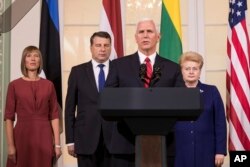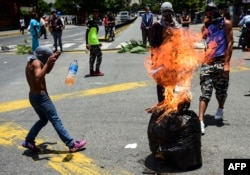U.S. Vice President Mike Pence heads Sunday to Latin America for a week-long trip to meet with the leaders of Colombia, Argentina, Chile and Panama.
Pence has in effect become a "roving ambassador" for the U.S. as the Trump administration has left many top diplomatic posts unfilled. Since April, Pence has visited South Korea, Japan, Indonesia and Australia, attended security meetings in Munich and Brussels, and traveled to Estonia, Georgia and Montenegro.
His Latin American trip comes at a time when the leaders of South and Central American countries may be somewhat distrustful of U.S. policies, following President Donald Trump's recent statement about not ruling out a "military option" for the political crisis in Venezuela.
His first stop Sunday will be with Colombian President Juan Manuel Santos.
Colombia 'military option'
Colombia's Foreign Ministry issued a statement shortly after Trump's "military option" warning. The ministry's statement said it condemned any "military measure and the use of force " and that efforts to resolve Venezuela's breakdown in democracy should be peaceful and respect its sovereignty.
Pence will undoubtedly talk to Santos about Trump's statement. He will also likely discuss Colombia's implementation of a controversial peace agreement with the rebel group FARC and the country's efforts to reduce production of coca for cocaine.
Chile
In Chile, Pence will face questions over the sudden U.S. withdrawal from the Trans-Pacific Partnership trade pact, Chile’s U.S. Ambassador Juan Gabriel Valdes told the VOA Spanish service. “With or without the U.S., we will continue working in the Asia Pacific to push for an agreement that results in clear rules for everyone,” Valdes said.
He added that his nation hopes the United States does not follow through on the threat to leave the Paris climate agreement because Chile believes that climate change is real.
China growing trade role in region
U.S. trading partner Panama, home to the Panama Canal, established diplomatic ties with China in June, and Pence’s upcoming visit comes against the backdrop of a growing Chinese trade role in the region.
Vice presidents do not determine U.S. policy, and none, “including Mike Pence, is going to be taking ownership of, say, foreign affairs, diplomatic relations,” said Christopher Devine, a political scientist at the University of Dayton.
“He's contributing to it,” he added, “or at least he should be if he’s playing the modern role, and what he’s doing is helping the president to carry out his policy.”
Vice presidents have been key intermediaries and trusted presidential advisors. Analysts say that although Pence’s diplomatic role is conventional so far, he works for a president who has promised to do things differently.






